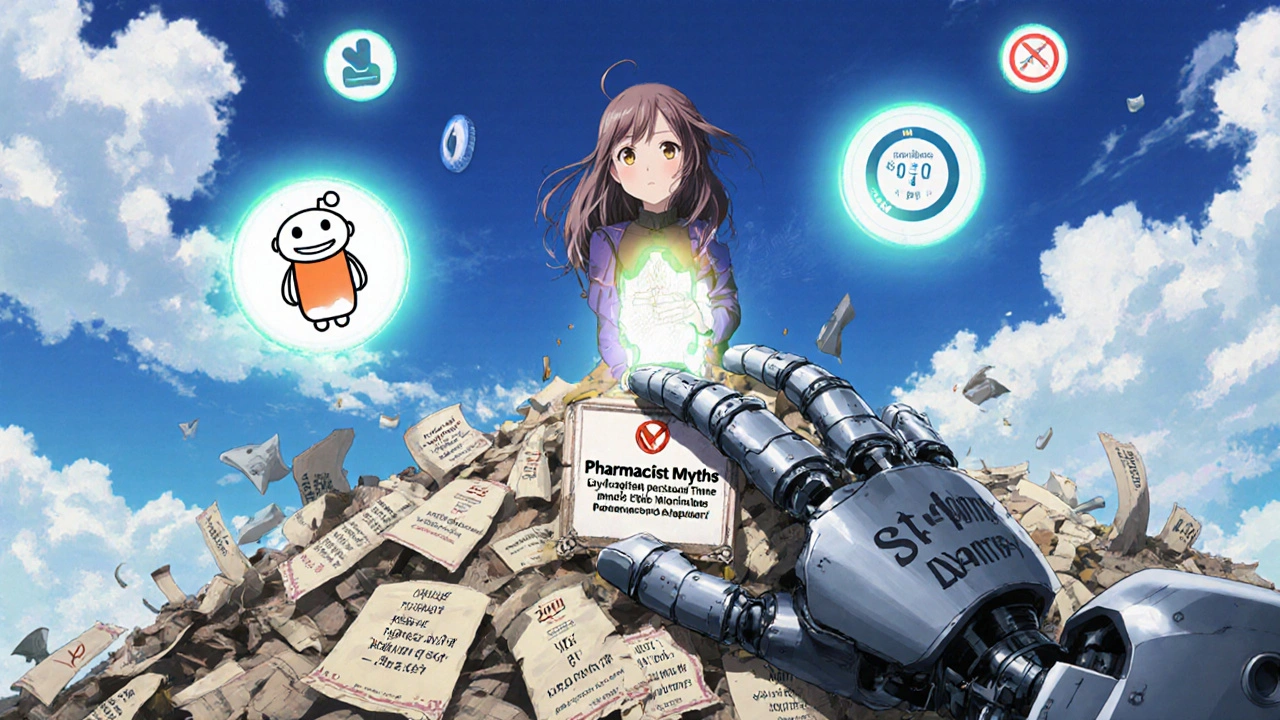Do Antibiotics Really Make Birth Control Pills Less Effective?
It’s one of the most common questions women ask their doctors: if I’m on antibiotics, do I need to worry about my birth control not working? For decades, the answer has been a loud, confusing "maybe." But the truth is far simpler-and most of what you’ve heard is wrong.
Here’s the bottom line: almost all antibiotics do not affect birth control pills. The idea that amoxicillin, azithromycin, or doxycycline can cause pregnancy while you’re on the pill is a myth. It’s been repeated so often that even some pharmacists still warn patients about it. But the science doesn’t back it up.
The One Antibiotic That Actually Does Interfere
There’s one exception-and it’s not what most people think. The only antibiotics proven to reduce the effectiveness of hormonal birth control are rifampin (also called rifampicin) and rifabutin. These are not common prescriptions. They’re used almost exclusively to treat tuberculosis (TB) or certain rare bacterial infections.
How do they work? These drugs force your liver to speed up the breakdown of hormones like ethinyl estradiol and progestin. Studies show rifampin can drop estrogen levels by up to 50% and progestin by over a third. That’s enough to make birth control pills ineffective. The CDC classifies this as a category 3 interaction: the risks clearly outweigh the benefits.
If you’re prescribed rifampin or rifabutin, you need backup contraception-like condoms-for at least 28 days after finishing the course. This isn’t optional. It’s based on real, measurable changes in hormone levels.
What About the Other Antibiotics?
Let’s clear up the list. Common antibiotics like amoxicillin, azithromycin, doxycycline, metronidazole, clarithromycin, and ciprofloxacin have been studied repeatedly. In every case, they show no meaningful effect on birth control hormone levels.
A 2011 review in Contraception looked at 14 studies and found zero evidence that penicillin-family antibiotics like amoxicillin interfere with estrogen absorption. A 2020 CDC analysis of 35 clinical trials confirmed that non-rifamycin antibiotics never drop hormone concentrations below the therapeutic threshold needed to prevent ovulation.
Even if you’re taking antibiotics for a UTI, strep throat, or sinus infection, your birth control is still working. No extra protection needed.
Why Does This Myth Keep Coming Back?
It started in the 1970s with a few unexplained pregnancy cases. At the time, scientists didn’t know why. Some women were taking rifampin for TB and got pregnant. Others were on amoxicillin and got pregnant. The media latched onto the idea: "antibiotics = birth control failure."
But later research showed those early cases were either misdiagnosed, involved rifampin, or were due to missed pills, vomiting, or diarrhea-not the antibiotics themselves. Still, the myth stuck.
Today, it’s reinforced by outdated pharmacy warnings, anecdotal stories on Reddit, and well-meaning but misinformed advice. A 2022 Planned Parenthood survey found 62% of women still believe antibiotics reduce birth control effectiveness. Even worse, 35% of pharmacists still recommend backup contraception for all antibiotics, according to a 2022 study in the Journal of the American Pharmacists Association.

What About Other Medications?
Antibiotics aren’t the only thing that can interfere with birth control. Other drugs are far more likely to cause problems:
- St. John’s wort (an herbal supplement for depression) can cut estrogen levels by up to 57%.
- Lamotrigine (for epilepsy) at doses over 300 mg/day reduces hormone effectiveness.
- Topiramate (also for seizures) at doses above 200 mg/day has the same effect.
- Some HIV medications, like efavirenz and nevirapine, interfere with hormonal birth control.
- Griseofulvin (an antifungal for ringworm) also reduces hormone levels and needs backup contraception for a month after use.
If you’re taking any of these, talk to your doctor. But for common antibiotics? You’re fine.
What About Rifaximin? I’ve Heard That’s a Problem Too
Many people confuse rifampin with rifaximin (brand name Xifaxan). They sound similar, but they’re not the same. Rifaximin is used for traveler’s diarrhea and irritable bowel syndrome. It doesn’t get absorbed into your bloodstream the way rifampin does. That means it doesn’t trigger liver enzymes to break down birth control hormones.
The FDA’s 2022 drug label for rifaximin explicitly states it has no interaction with hormonal contraceptives. So if you’re prescribed Xifaxan, no extra protection is needed.
What Should You Actually Do?
Here’s your simple action plan:
- If your doctor prescribes rifampin or rifabutin → use condoms or another backup method for 28 days after finishing the course.
- If you’re prescribed any other antibiotic → continue your birth control as normal. No backup needed.
- If you’re taking St. John’s wort, lamotrigine, topiramate, or certain HIV meds → talk to your provider about switching birth control or adding backup.
- If you’re sick and vomiting or have severe diarrhea → your birth control might not absorb properly. Use backup for 7 days after symptoms stop.
That’s it. No guesswork. No unnecessary condoms. No panic.

Why This Matters Beyond Pregnancy Risk
Believing this myth isn’t just confusing-it’s harmful. It leads women to stop taking their birth control pills out of fear. It causes unnecessary stress. It makes people feel guilty when they get pregnant, even though the pill was never the problem.
It also distracts from real risks. If you’re on rifampin and don’t know it interacts with your pill, you’re at real risk. But if you’re wasting energy worrying about amoxicillin, you’re ignoring the actual threats: missing pills, drug interactions with epilepsy meds, or using herbal supplements without knowing the consequences.
What Do Experts Say?
The consensus is overwhelming:
- The Centers for Disease Control and Prevention (CDC) says non-rifamycin antibiotics don’t reduce hormone levels to dangerous levels.
- The American College of Obstetricians and Gynecologists (ACOG) states clearly: "There is no evidence that antibiotics decrease contraceptive effectiveness."
- Dr. Jen Gunter, OB/GYN and author of The Menopause Manifesto, says: "There is zero evidence that common antibiotics like amoxicillin affect birth control."
- A 2023 survey of 500 board-certified OB/GYNs found 98% agreed: only rifamycins require backup contraception.
Yet, the myth persists. Why? Because it’s easier to say "use a condom" than to explain cytochrome P450 enzyme induction. But that’s not good enough. Patients deserve accurate information.
Final Takeaway: Know the Real Risks
You don’t need to memorize every drug name. Just remember this:
- Rifampin and rifabutin → backup contraception needed.
- Everything else → your pill is still working.
- St. John’s wort, epilepsy drugs, HIV meds → talk to your doctor.
- Vomiting or diarrhea → use backup for 7 days.
If you’re ever unsure, ask your pharmacist or doctor to check the drug label. Most now say it outright: "Rifampin may reduce effectiveness. Other antibiotics do not."
The truth is simple. The myth is loud. Choose the truth. Your birth control is still working. You don’t need to panic.
Do amoxicillin or azithromycin make birth control pills less effective?
No. Amoxicillin, azithromycin, doxycycline, metronidazole, and other common antibiotics do not reduce the effectiveness of birth control pills. Multiple studies, including a 2011 systematic review and a 2020 CDC analysis of 35 trials, confirm that these antibiotics do not lower hormone levels enough to affect ovulation prevention.
What antibiotics actually interfere with birth control?
Only rifampin (Rifadin) and rifabutin (Mycobutin), used to treat tuberculosis, have been proven to interfere. Griseofulvin, an antifungal for skin infections, also reduces hormone levels. These drugs speed up liver metabolism of estrogen and progestin. All other antibiotics-including those for UTIs, strep throat, or sinus infections-do not.
Do I need to use condoms if I’m on antibiotics?
Only if you’re taking rifampin or rifabutin. In that case, use condoms or another backup method for 28 days after finishing the course. For all other antibiotics, including amoxicillin and doxycycline, no backup is needed. The CDC and ACOG both state that backup contraception is unnecessary for non-rifamycin antibiotics.
Can I trust what my pharmacist says about antibiotics and birth control?
Not always. A 2022 study found 35% of pharmacists still recommend backup contraception for all antibiotics, even though medical guidelines say it’s unnecessary. Pharmacists often rely on outdated protocols or patient fear rather than current evidence. Ask them to check the CDC’s 2021 guidelines or the drug label, which now clearly states that only rifampin, rifabutin, and griseofulvin require caution.
I got pregnant while on antibiotics and birth control. Was it the antibiotics?
Almost certainly not-if you were taking a common antibiotic like amoxicillin. Pregnancy while on the pill is far more likely due to missed pills, vomiting, diarrhea, or interactions with other drugs like St. John’s wort or seizure medications. If you were taking rifampin, that’s a different story. But for the vast majority of cases, the antibiotics weren’t the cause.
Is it safe to take St. John’s wort with birth control?
No. St. John’s wort can reduce estrogen levels by up to 57%, making birth control pills much less effective. It’s one of the most dangerous herbal interactions with hormonal contraception. If you’re taking it for depression or anxiety, talk to your doctor about switching to a non-interacting antidepressant or using a non-hormonal birth control method like an IUD.
What if I’m on rifampin and I forget to use backup? Can I just start again?
If you had unprotected sex while taking rifampin and didn’t use backup, you could be at risk for pregnancy. Stop taking your birth control pills immediately and take a pregnancy test. Once you confirm you’re not pregnant, you can restart your pill-but only after you’ve been off rifampin for at least 28 days. Until then, use condoms. Your hormone levels need time to return to normal.
Does diarrhea or vomiting affect birth control more than antibiotics?
Yes. If you vomit within two hours of taking your pill, or have severe diarrhea for more than 24 hours, your body may not absorb the hormones properly. That’s a bigger risk than any antibiotic. Use backup contraception for seven days after symptoms stop, and consider taking another pill if you vomit. This applies regardless of whether you’re on antibiotics.
